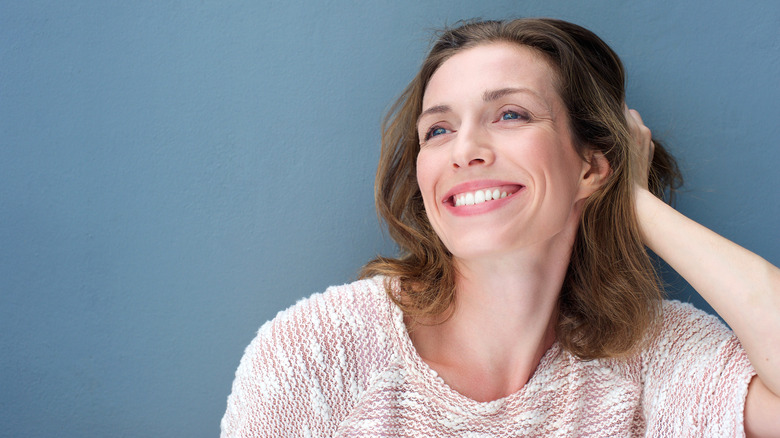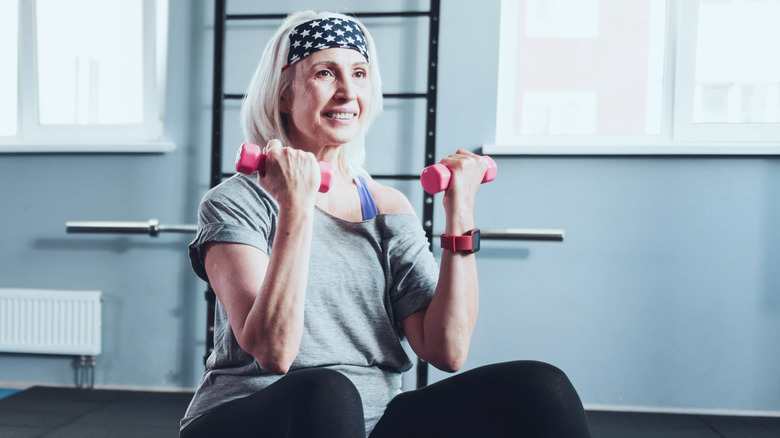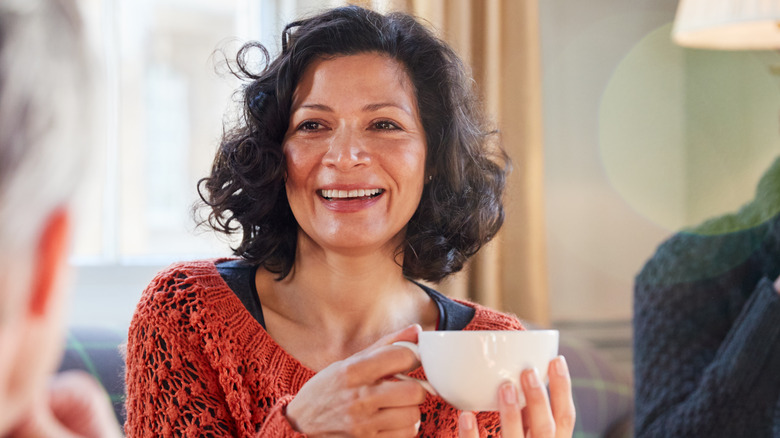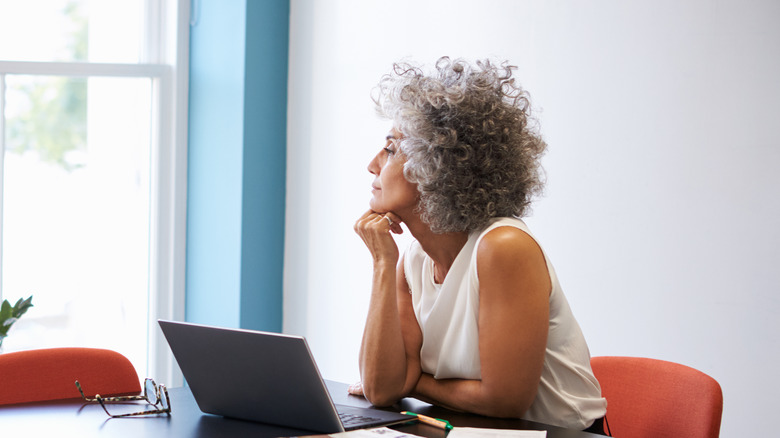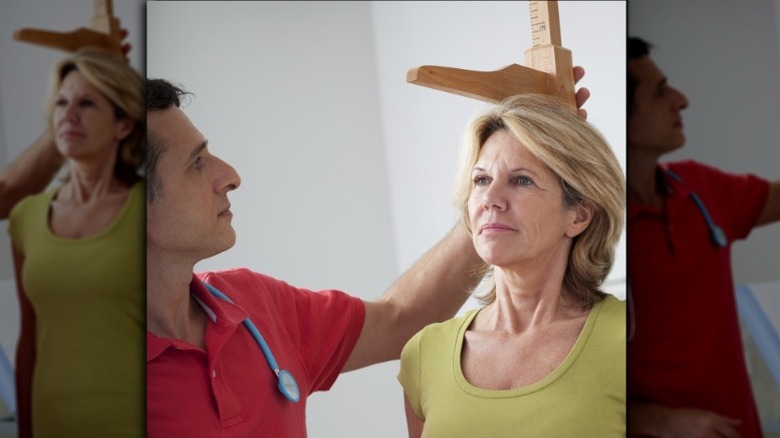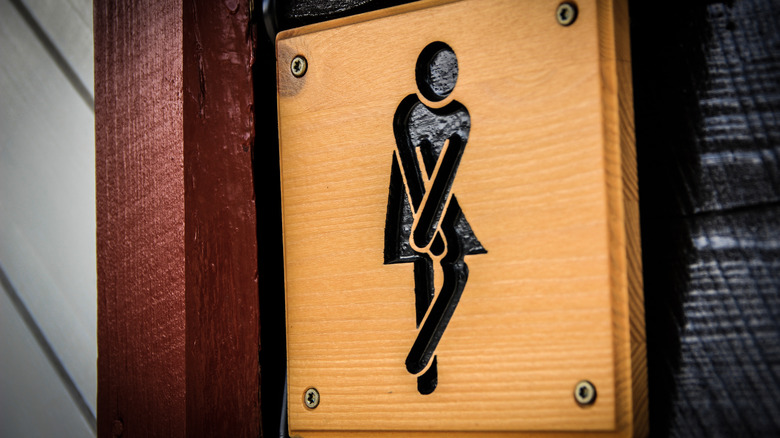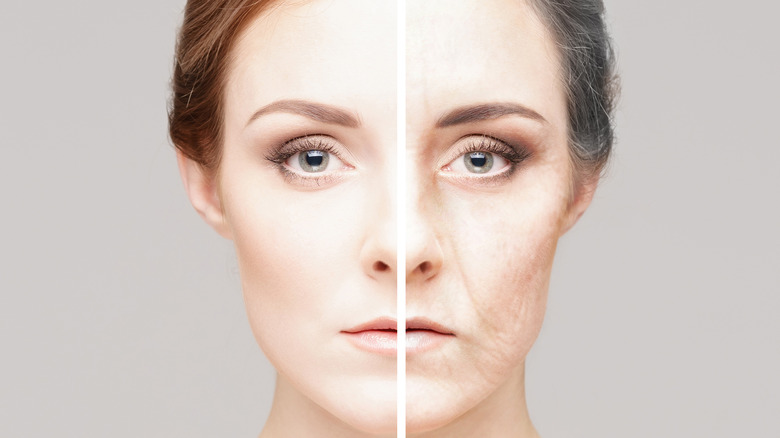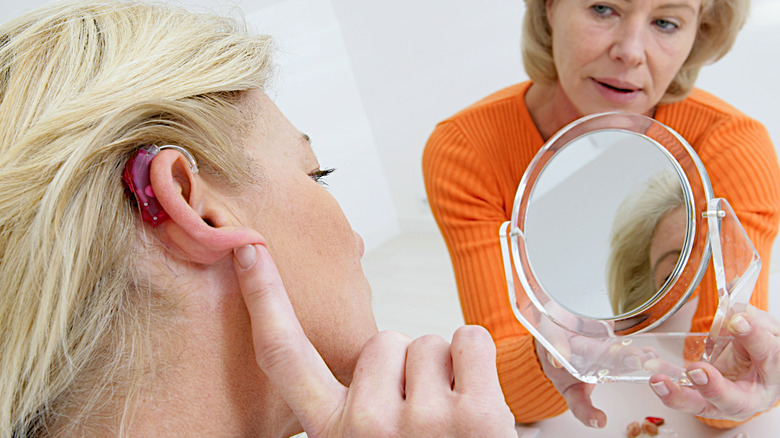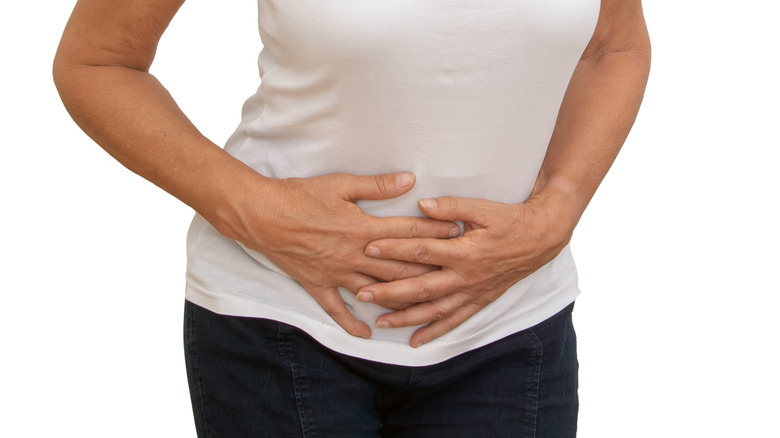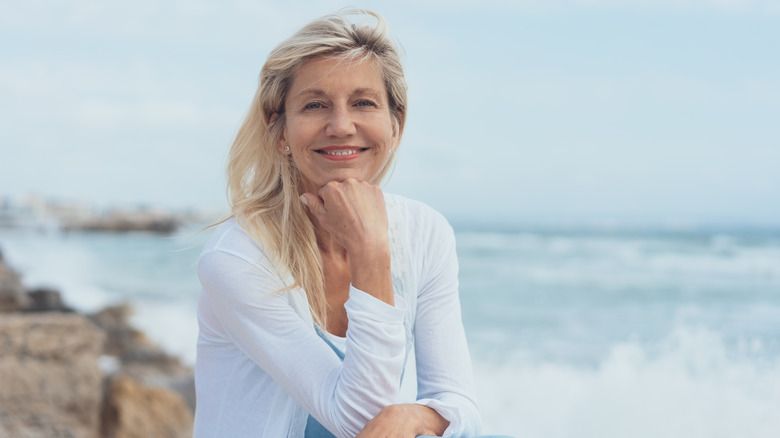What Happens To Your Body As It Ages
If you're nervous about getting older, you can at least take comfort in knowing you're not alone. Gail Saltz, a psychiatrist and television commentator, wrote on health.com that the fear of aging is one of the most common phobias people experience.
Whether you're worried about getting older because you fear slowing down or even death, there are perks — yes, perks — that come with aging. "It sounds cliché, but please don't forget that with age comes wisdom, experience, often a wider circle of loved ones, and more comfort and security in your sense of self," wrote Saltz. Getting older may be nonnegotiable, but how you age is certainly able to be altered. Exercise, diet, and financial planning are all things that can make old age a more pleasant experience.
Do you want to know what to expect as you get older? Here are some of the wild things that happen to your body as it ages, plus some things you can do to age successfully.
You sweat less
In your younger years, sweating may seem more of a nuisance than anything else. Still, sweat has some pretty incredible healing properties. According to researchers, eccrine sweat glands are vital for reepithelialization — a fancy scientific word for wound healing.
While it's awesome that sweat can literally help our bodies heal, there is a problem. "Elderly people tend to sweat less than young adults," Laure Rittié, a research assistant professor at the University of Michigan Department of Dermatology, told Michigan Medicine. You could read that and think that sweat glands simply slow down as you age, but that's actually not the case. Instead, it's aged skin that makes sweating — and healing — more difficult. As you age, your skin slowly degrades and becomes less capable to support new skin cells. Not cool. But, there is something simple you can do now to protect those precious sweat glands and improve wound healing in the future.
"Chronic sun exposure is an important factor that damages skin structures that normally support sweat glands. This is thus yet another good reason to wear sunscreen!" Rittié explained. Deal!
Your teeth become less sensitive
If you have sensitive teeth, you well know that it's not a fun experience. Both cold and hot foods can aggravate your chompers, leading to an aching mouth. As you age, however, your teeth will become less and less sensitive. While this sounds like a good thing — especially for sensitive teeth sufferers — they can become so desensitized that it becomes a whole new problem. According to the American Dental Association (ADA), the nerves in your teeth can shrink as you age, which is what causes the lack of sensitivity. When this happens, you may not be able to feel cavities or other dental issues as they crop up. This is why seeing the dentist regularly is so important, especially as you age.
You may think that, if you live long enough, losing your teeth is an eventuality. It's true that your teeth change as you get older, but a life of dentures isn't necessarily inevitable. "If cared for properly, your teeth can last a lifetime," says ADA. No one likes going to the dentist, but this is just another important reason to practice good oral hygiene — and make those teeth-cleaning appointments — now.
The incredible shrinking brain
The nerves in your teeth aren't the only body parts to get smaller as you get older. As horrifying as it sounds, your brain shrinks as you age. It's true. William Klemm, a senior professor of neuroscience at Texas A&M University explained why, saying, "It is not so much that neurons die, but that their terminals and synaptic junctions shrivel." While it's certainly not pleasant to think of the most important organs in your body shriveling away, it's important to note that not everyone experiences shrinkage to the same degree.
In a study cited by the professor, some people were found to have more cortical volume than others. Klemm dubbed these ones "super-agers." And they really were. Their memories were better and they lost much less volume over 18 months than those with "average memory."
But how can you be a "super-ager"? Charles DeCarli, director of UC Davis Alzheimer's Disease Center, told Medical News Today by way of a pun: "It's a no brainer." Because of the multitude of factors contributing to the incredible shrinking brain, he further explained, saying, "People should stop smoking, control their blood pressure, avoid diabetes and lose weight."
Growing shorter
If you've ever visited an elderly relative and felt like they must've been taller the last time you saw them, it's not all in your imagination. From age 30 (yes, 30!) to 70, men can lose about an inch off of their height, while women can lose as much as two inches. From 80 years old onward, both sexes can shrink one additional inch. Yikes!
Pham Liem, a geriatrician at the University of Arkansas for Medical Sciences (UAMS) Donald W. Reynolds Institute on Aging, explained this phenomenon to UAMS, saying, "Older adults can get shorter because the cartilage between their joints gets worn out and osteoporosis causes the spinal column to become shorter," The bones, too, lose calcium and other important minerals during the aging process — a problem that especially affects postmenopausal women, according to Medline Plus. Not only that, but men and women also lose muscle mass as they age, sometimes replacing it instead with fat.
All hope is not lost, though. A healthy diet and a good exercise program can go a long way.
Your bladder develops a mind of its own
While aging wreaks havoc on the bodies of men and women alike, women deal with another less than fun process: menopause. During which, urinary functions get all out of whack. The University of Colorado Urogynecology cites estrogen — or the lack thereof — as one of the major causes. During menopause, the release of the hormone estrogen is reduced and, without it, the bladder becomes weaker. This can cause urinary atrophy and all of its symptoms, like incontinence and an increase in the need to urinate. As if that weren't bad enough, menopause essentially piggybacks on aging, which also works against pelvic organs and tissues.
Although no one wants to experience this side of aging, there are things that can lessen these frustrating bladder issues. For some women, hormone therapy can be beneficial. Hormone-free alternatives — including reducing your caffeine intake, doing Kegel exercises, and maintaining a healthy weight — are also worth trying.
Your face changes radically
Does your face really change that much when you age? Oh, yes, according to Women's Health. In your 20s, you have collagen-rich skin and subcutaneous fat, or fat below the surface of your skin, in all the right places — making for adorable and firm apples of your cheeks.
When you reach your 30s, sun spots, including those pesky dark patches that often appear on the forehead, cheeks, and chin, become noticeable. While this usually comes from sun exposure — yet another reason to wear sunscreen in your youth — some women develop hyperpigmentation while pregnant or on birth control. You'll also start to lose some volume, which may make your face look thinner, but also older.
In your 40s, your skin becomes drier, which makes fine lines and wrinkles more pronounced. Moisturizer is especially important at this stage in life. Additionally, your subcutaneous fat will dwindle away even more — and unevenly. Starting often in the mid-face and lastly around the jawline. "It looks like the skin is falling, but actually our faces are deflating," Heidi Waldorf, director of laser and cosmetic dermatology at The Mount Sinai Medical Center in New York City, explained. How comforting.
Losing your senses?
When you were little, you learned about your five senses and all the ways they help you take in information about your surroundings. What you probably didn't learn, however, is that these senses dull as you age.
Mediline Plus explained that, as your body grows older, your ability to hear and differentiate sounds decreases. You may not be able to tune out background noise or your balance may even become a bit off. This is all due to the decline of the functions of your inner-ear structures. Similarly, eye structures change with old age. Your corneas become less sensitive, your pupils get smaller, and your eyes sink further back into their sockets — eek. Naturally, your vision also declines.
As you get older, your taste buds will also shrink and your sense of smell will start going away — especially after the age of 70. Your final sense, touch, is an important one as it helps you recognize pain, hot and cold temperatures, and pressure. As you age, though, these sensations seem weaker because of decreased blood flow to your spinal cord, nerve endings, or brain.
There are ways to counteract failing senses, but talk to your doctor first.
Digestion ain't what it used to be
When your digestive system is in perfect working order, you might not think about it much. But what about when it's not up to par? It could be the only thing on your mind.
When speaking to WebMD, Ira Hanan, an associate professor of medicine at the University of Chicago Medical Center, likened the digestive system to a toothpaste tube: your digestive system works by squeezing food through your digestive tract like you would squeeze toothpaste from a tube. In our older years, this process slows. In doing so, more water is absorbed and causes constipation. For people aged 60 to 70, constipation is one of the most common digestive problems, said Hanan. As old age often brings with it other health problems, medication usage increases among the elderly and many of those medications aren't easy on the digestive system. Ellen Stein, an assistant professor of medicine at Johns Hopkins Hospital in Baltimore, Maryland, also explained that inactivity can add to the problem.
Nevertheless, you can prevent a lot of these digestive issues by monitoring your medications, upping your fiber intake, drinking more fluids, managing your weight, and staying active.
All in all, you'll still feel pretty good
Getting older sounds downright depressing, doesn't it? While there are definitely more cons than pros when it comes to aging, something pretty amazing happens that makes all of this getting older stuff more manageable.
A study of over 1,000 men and women between the ages of 50 and 99 measured chronic disease and disability, but also social engagement and the participants' own assessments of their health — with surprising results. "Even though older age was closely associated with worse physical and cognitive functioning, it was also related to better mental functioning," the study's co-author Colin Depp, an associate professor of psychiatry at University of California San Diego School of Medicine, explained. "It was clear to us that, even in the midst of physical or cognitive decline, individuals in our study reported feeling that their well-being had improved with age," principal investigator Dilip V. Jeste added.
That's right, in the face of so much, you can actually feel better the older you get. And, no, this isn't on account of our brains shrinking. At least, we hope not.
